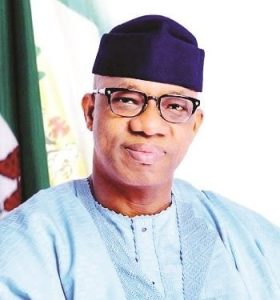
In his inauguration speech barely two years ago, Ogun State Governor, Prince Dapo Abiodun, did not mince words about the governance direction and political paradigm of his administration. When he chose the slogan “building our future together,” many people probably took it with a pinch of salt and felt the watchword was merely another empty proposition or gimmick typical of power-seeking politicians.
Abiodun, who rode to power after a tortuous and turbulent gubernatorial journey, had promised to premise his government on the framework of inclusiveness, collaboration and collectivism. Perhaps, he went this road judging from the events leading to his emergence as the All Progressives Congress (APC) standard bearer.
Recall that it was 16 years after he had aspired to be governor that his dream eventually became a reality. The Iperu-born businessman, with no fewer than 40 other candidates across various political parties, contested the 2019 gubernatorial election in Ogun State. Steering through the tempest ignited by the stiff opposition from the then incumbent governor, Senator Ibikunle Amosun, who sponsored another candidate and openly vowed not to support his own ambition, Abiodun strategically positioned himself as the candidate to beat at the polls and went on to spring surprise.
As someone who had succeeded in boardroom politics and built up multi-billion businesses from ground zero, the APC candidate appeared to have the experience, skills and know-how to navigate tricky terrains and he sure demonstrated these abilities while seeking the number one seat in his home state.
According to results of the 2019 governorship election announced by the Independent National Electoral Commission (INEC), Abiodun polled 241,670 votes to defeat his fiercest challenger and candidate of Allied People’s Movement (APM), Adekunle Akinlade, who had 222,153 votes. The African Democratic Congress (ADC) governorship candidate, Prince Gboyega Isiaka, came third by polling 110,422 votes while the Peoples Democratic Party (PDP) standard bearer, the late Senator Buruji Kashamu, scored 70,290 votes to emerge fourth.
However, the governor is not one inclined to winner-takes-all mentality. From the outset, he gave his words on running a broad-based regime; a government that would actualise the vision to “give Ogun State focused and qualitative governance and to create the enabling environment for a public private sector partnership, which is fundamental to the creation of an enduring economic development and individual prosperity of the people”.
“The task of building our future is a collective task,” the Governor had declared in his address to the mammoth crowd that gathered at the MKO Abiola International Stadium, Abeokuta on May 29, 2019 to witness his swearing-in ceremony. “It is beyond what I alone can shoulder or the team that will work with me in government.”
Assuring that the government under his watch would be people-oriented, Abiodun had said the pre-inauguration composition of Economic Transition Committee and Work Groups comprising stakeholders from diverse professions and political persuasions, aimed at developing a blueprint and an implementation roadmap for the state, will continue to underpin the conduct of his government affairs.
“My strong belief is that our state will benefit from the collective wisdom, knowledge and passion of all citizens that are in abundance across the different regions of our state and the political parties and groups,” the Governor submitted. He added that his decision to extend hands of fellowship to co-contestants, leaders and members of other parties was not to achieve political correctness but a genuine commitment to inclusiveness.
Indeed, Abiodun’s inclusive governance is not by lip service in any way.
In recent times, top politicians from opposition parties and different power blocs have moved en masse to the APC. Interestingly, all the former democratically elected governors of the state, former deputy governors, former speakers and other political bigwigs are now in the governing party under Abiodun’s leadership.
Some leading figures that have joined the train include former two-term governor and Director-General of the Atiku Abubakar Presidential Campaign Organisation in 2019 election, Otunba Gbenga Daniel; former House of Representatives Speaker, Dimeji Bankole; erstwhile ADC governorship candidate, Prince Gboyega Isiaka; gubernatorial candidate of Social Democratic Party (SDP), Otunba Rotimi Paseda; and key associates of the late Senator Buruji Kashamu.
Interestingly, also, all the state House of Assembly members hitherto elected on the platform of opposition parties like ADC, APM and PDP have defected to the APC, thereby making the 26-member state legislature a one-party affair.
But beyond the frenzy this has generated, the influx to APC which seems to be changing the political configuration of the state was actually a masterstroke pulled by the Governor. Although it whittles down opposition and tends to drive the state towards one-party, pundits posit that the development portends a good omen because there is strength in togetherness.
Moreover, if various shades of interests are gravitating towards his party and administration, some observers believe definitely there must be something right being done by the Governor to attract converts.
Upon taking the mantle of leadership, Abiodun has left no one in doubt of his determination and resolve to transform the state. He set out to achieve this through a number of initiatives encapsulated under ISEYA, the acronym for the five developmental pillars of his administration that include Infrastructure, Social Welfare and Wellbeing, Education, Youth Development and Agriculture and Food Security.
Although the global outbreak of coronavirus pandemic which ravaged economies around the world slowed down the pace at which his government had planned to move, it is indisputable that the state has made substantial progress under the present administration within the available limited resources.
In terms of roads reconstruction and rehabilitation across the three senatorial districts of the state, healthcare delivery, education sector revitalisation, affordable housing projects, agricultural development, digital and technological revolution, better sports development, and improved welfare of workers, the Abiodun-led administration has redefined the Gateway State.
 DailyrecordNg …Nigeria's hottest news blog
DailyrecordNg …Nigeria's hottest news blog








